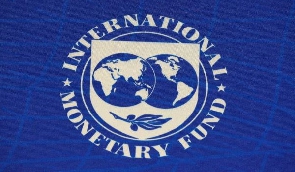 International Monetary Fund (IMF) logo
International Monetary Fund (IMF) logo
The astute Ghanaians shouldn't celebrate the $3 billion IMF bailout by the first quarter of 2023 with the ignorant family, Ken Ofori-Atta, Gabby Otchere Darko, and Akufo Addo, as claimed by the finance minister.
Since many Ghanaians, in my opinion, believe that everything that shines is gold, it seems to me that they have failed to recognize the fact that the country is run by an ignorant family that apart from corruption, lacks any knowledge of leadership or finance.
The stated objectives of the IMF appear to be quite humane and peaceful at first glance—supporting the economies of needy nations and providing loans for domestic development.
However, many citizens of developing nations are unaware that the International Monetary Fund is a parasitic system whose external assistance undermines the very foundations of the state and weakens the developing nations they assist.
When giving a loan, the IMF consistently makes the same suggestions and demands: you must quickly rebuild your economy and regain solvency by raising your income. There is just one option left if this cannot be accomplished: significantly cut expenses.
This entails eliminating domestic economy subsidies, raising the tax rate on the general populace, and drastically cutting social spending. Can Ghanaians refer to these harsh conditions as comfort or the government's success?
When you assume leadership or appoint someone to manage a country's finances, the country needs intelligent people in that profession. Ghanaians shouldn't expect the International Monetary Fund to develop their country even if it gives them $500 billion because the people in charge don't have the brain to lead a country to success. Ghanaians shouldn't waste their time on entrepreneurs who, given a dollar, are only unable to turn a 20-cent profit.
The simplest way to sum up Ken Ofori-Atta and Akufo Addo is as persons who make the claim to be mechanics but have no understanding of where the alternator is located in an engine. They ruined the entire engine while attempting to fix the defective part that was draining the battery. They will be holding the tools and tinkering with the engine as if they are qualified mechanics, refusing to apologize to the owner of the automobile for destroying it. This is the issue Ghana is currently facing.
One of the reasons I am not happy about Ken Ofori-Atta is that he is neither someone who knows something about finance nor the person he professes to be. Ghanaians are currently paying a high price for the NPP government's incompetence.
Even though he has provoked, hurt, and angered weak people, any educated person would have quit that job, but he chose not to. This makes me think about an article I wrote about the president, "By Force President, By Force E-Levy, Everything About Akufo Addo Is By Force," which I wrote.
It's not an exaggeration to say that Ken Ofori-Atta and Akufo Addo, run entirely everything in the country by force since they lack the skills necessary to develop good leadership. They believed that bringing deceit and lies to politics would make them great in addition to their covert corruptible dealings, but it has instead exposed them.
Time will tell, and readers will recall that I claimed that both the president and the finance minister are buffoons who are incapable of rescuing Ghanaians from the dire economic situation they have brought about, despite IMF’s assistance.
1. The IMF began shifting its focus to the Third World or developing nations at the start of the 1970s. Sadly, things did not turn out well for those developing countries they assisted. For example, as a result of the fund allots of $150 million to Somalia in 1980, attempts to implement the organization's recommendations in the nation's internal economic life, result in the collapse of the economy itself, followed by the collapse of the entire state.
2. Sudan's cooperation with the IMF, which got 260 million for economic structural reforms in 1982, likewise turned out to be a tragic experience. The changes came to a halt as a result, but there was still a need to pay the enormous debts. Political unrest eventually results from the economic collapse, which is exacerbated by an uprising in the country's south.
Even though the total amount of debt, along with various fines and penalties, has already reached more than $1 billion, Sudan, which has already lost its southern provinces, has so far continued to make payments on its IMF obligations.
3. The Rwandan situation is also highly important. Contrary to most other nations on the Black continent, this little African nation showed relatively significant economic development in the late 1980s, particularly in the area of agriculture. A terrible two-year drought, which caused the collapse of the national economy, stopped everything, though.
As a result, the government of the nation requested a loan from the IMF. In response, the Fund urged that steps be taken to lower the national currency and stop aiding regional farmers. As in the case of Somalia, all of these actions led to a civil war that took the lives of almost 2 million people.
Any sensible Ghanaian shouldn't be pleased about the IMF's support to the nation for the following reasons, among others. More importantly, the IMF in particular is a parasitic system that weakens state institutions and weakens developing nations as a result of foreign funding.